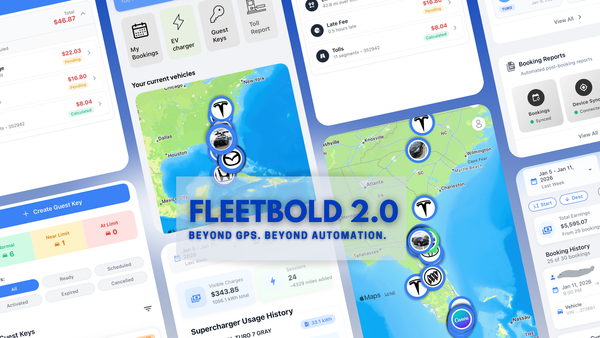Turo Cancels Its IPO Plans: What Does It Mean?
Turo’s cancellation of its IPO marks a significant shift in the car-sharing industry. This blog explores the reasons behind Turo's decision, its impact on the car-sharing market, and how businesses can adapt to these changes using FleetBold's innovative fleet management solutions.

Introduction: The Changing Landscape of the Car-Sharing Industry
Over the past decade, the car-sharing industry has grown significantly, driven by evolving consumer behaviors, urban mobility trends, and increasing demand for on-demand transportation options. As one of the most recognized players in the sector, Turo’s decision to cancel its highly anticipated IPO has sent ripples through the industry.
The IPO cancellation has sparked debates about the future of car-sharing and how businesses in this sector will adapt to market shifts, increasing competition, and new consumer expectations. What’s more, the decision signals a broader trend of cautiousness in the market, influenced by economic uncertainty and changing investor sentiment.
This blog will explore the reasons behind Turo’s decision, the implications it has for the car-sharing industry, and how businesses can respond to these changes. We’ll also delve into the critical role that technological innovation plays in ensuring businesses remain competitive in a shifting landscape.
Understanding Turo’s Decision to Cancel Its IPO
Turo, the peer-to-peer car-sharing platform that allows individuals to rent their vehicles to others, initially filed for an IPO with the hopes of capitalizing on the growing demand for car-sharing services. The platform was poised to enter the public market, expecting to raise significant capital to fuel expansion and operational growth. However, Turo's decision to pull back from the IPO raises questions about the challenges that companies in the car-sharing industry face in today’s economic environment.
Shifting Market Dynamics
The car-sharing industry, while expanding rapidly, has been subject to fluctuating market dynamics, especially as consumer behavior continues to evolve. With the rise of other mobility solutions such as ride-hailing and electric scooters, the demand for traditional car-sharing services like Turo’s has faced some pressure. Additionally, Turo’s business model, which relies heavily on consumer-to-consumer transactions, has proven to be more volatile compared to traditional rental models. This volatility, combined with rising operational costs, may have made it difficult for Turo to present a clear path to profitability, a critical factor for attracting investor confidence.
Economic Uncertainty
The broader economic uncertainty has also played a major role in Turo’s IPO decision. With inflationary pressures, global supply chain disruptions, and economic slowdowns in various regions, investors have become more cautious. The car-sharing industry, in particular, has felt these impacts, with rising costs in vehicle acquisition, maintenance, and insurance, all contributing to tighter margins for businesses like Turo. Economic uncertainty often leads to increased risk aversion among investors, especially for companies that depend heavily on consumer behavior, which can fluctuate with economic conditions.
Increased Competition
Turo’s decision to cancel its IPO also reflects the increasingly competitive nature of the car-sharing and car rental industries. While Turo has been a leader in the space, it now faces a growing number of competitors, both traditional and new, each looking to capture their share of the expanding market. From established car rental companies offering more flexible services to newer, tech-driven startups gaining traction, the competitive landscape has become crowded. To maintain its market leadership, Turo must focus on innovation and efficiency while continuing to build a loyal customer base.
Implications for the Car-Sharing Industry
Turo’s decision to step back from the public markets could have several far-reaching implications for the broader car-sharing industry. From investor sentiment to market competition and technological innovation, this move could set the stage for significant shifts in the industry over the next few years.
1. Investor Confidence in Car-Sharing
The decision to cancel the IPO may lead to a more cautious approach from potential investors toward car-sharing businesses. The public market has traditionally been a source of growth capital for high-growth sectors like car-sharing, but with Turo pulling back, investors may reconsider how they evaluate the financial sustainability of such businesses. Companies that rely heavily on volatile consumer demand or lack a clear, proven path to profitability may find it increasingly difficult to attract capital.
Moreover, investors may begin to favor companies that have a strong financial foundation and a more predictable revenue model. Car-sharing companies will need to demonstrate operational resilience, financial discipline, and scalability to secure funding from private investors or public markets in the future.
2. Increased Competition and Market Consolidation
As Turo takes a step back, the door may open for other companies to increase their market share. Smaller startups and traditional car rental companies that have already begun offering car-sharing services might view this as an opportunity to double down on their efforts, investing in new technologies and scaling up their operations. Additionally, some businesses may seek to merge or acquire smaller competitors to gain a competitive edge, leading to further consolidation in the industry.
The industry is likely to see more aggressive competition, with companies striving to outdo each other in terms of technology, fleet management, customer experience, and pricing models. To stay competitive, businesses must continuously innovate and adapt to consumer demands, finding new ways to improve the user experience and operational efficiency.
3. Technological Innovation and Digital Transformation
For car-sharing companies to stay ahead of the competition, innovation will continue to be key. Businesses that invest in technology to streamline operations, enhance customer experiences, and improve vehicle tracking will have a distinct advantage. The rise of telematics, real-time tracking, and automated fleet management solutions will be crucial for companies looking to optimize their services and reduce operational costs.
FleetBold recognizes the importance of technology in the car-sharing industry. Our fleet management platform provides businesses with real-time tracking, vehicle diagnostics, and predictive maintenance features that allow companies to maximize fleet performance and reduce costs. As the car-sharing industry evolves, FleetBold is committed to providing innovative solutions that help businesses thrive in a rapidly changing environment.
The Bigger Picture: Adapting to Market Changes
Turo’s decision is part of a larger trend within the mobility sector. The rapid growth of shared mobility platforms has been followed by increasing market saturation, rising competition, and shifting investor expectations. For businesses in the car rental and car-sharing spaces, these changes underline the importance of staying agile and adapting to new market conditions.
1. Operational Resilience
In an ever-changing market, operational resilience is critical. Businesses must be able to adapt to shifts in consumer behavior, economic conditions, and technological advancements. This means having a flexible business model that can adjust to changing demand, managing costs efficiently, and investing in the right technologies to ensure long-term success.
2. Customer-Centric Strategies
The car-sharing market has always been driven by customer demand. To remain competitive, businesses need to focus on offering exceptional customer service, convenience, and flexibility. This includes offering more personalized services, flexible booking options, and seamless experiences through mobile apps. Building strong relationships with customers through loyalty programs and superior service will be key to retaining business and gaining repeat customers.
3. Embrace Technological Advancements
The future of car-sharing lies in innovation. To stay ahead, companies must invest in technology that enhances operational efficiency and improves the customer experience. This includes fleet management tools, mobile apps for booking and communication, and predictive analytics to better understand customer preferences and behavior.
At FleetBold, we provide cutting-edge telematics technology that helps car-sharing businesses stay ahead by offering real-time tracking, vehicle maintenance alerts, and fleet management solutions that streamline operations and enhance profitability.
How FleetBold is Helping the Car-Sharing Industry Thrive
At FleetBold, we understand the pressures and challenges that car-sharing businesses face in a rapidly evolving market. Our platform is designed to provide advanced fleet management tools that optimize operations, reduce costs, and improve the overall customer experience.
Key Features of FleetBold’s Fleet Management Platform:
- Real-Time Tracking: Track your fleet of vehicles in real time, ensuring efficient operations and better decision-making.
- Predictive Maintenance: FleetBold’s telematics systems provide proactive maintenance alerts, helping prevent unexpected downtime and repair costs.
- Enhanced User Experience: Our platform integrates with mobile apps, allowing customers to book, track, and communicate with fleet operators seamlessly.
By leveraging FleetBold’s technology, car-sharing businesses can stay competitive, even in the face of increasing market pressures.
Conclusion: A New Era for the Car-Sharing Industry
Turo’s decision to cancel its IPO is a significant event that highlights the challenges and opportunities facing the car-sharing industry in 2025. As market dynamics shift, businesses must focus on innovation, operational efficiency, and customer-centric strategies to stay competitive. With technological advancements like FleetBold’s fleet management platform, companies can navigate these changes with confidence and position themselves for long-term success.
At FleetBold, we are committed to helping car-sharing businesses thrive in this evolving market. By providing cutting-edge fleet management solutions, we empower businesses to optimize their operations, reduce costs, and deliver an exceptional customer experience.
Visit FleetBold for more information on how our technology can help your business succeed in the future of car-sharing.
FAQ
- Why did Turo cancel its IPO? Turo’s decision to cancel its IPO is likely due to market uncertainty, economic pressures, and increased competition in the car-sharing industry. These factors made it difficult for Turo to meet the expectations of public investors.
- What does Turo’s decision mean for the car-sharing industry? Turo’s cancellation signals caution among investors and could lead to increased competition. The decision also underscores the need for car-sharing businesses to adapt to market changes and focus on profitability.
- How can businesses adapt to these market changes? Businesses can adapt by focusing on customer experience, investing in technology to improve fleet management, and ensuring operational resilience to navigate economic uncertainty.
- What role does technology play in the car-sharing industry? Technology plays a critical role in improving fleet efficiency, optimizing routes, and enhancing customer experiences. Businesses that leverage telematics and fleet management systems will have a competitive edge.
- How can FleetBold help my car-sharing business? FleetBold offers real-time tracking, predictive maintenance, and fleet management solutions that help businesses optimize their operations and reduce costs, ensuring long-term success.
Sources:
- For more insights on car-sharing trends and fleet management, visit FleetBold.





